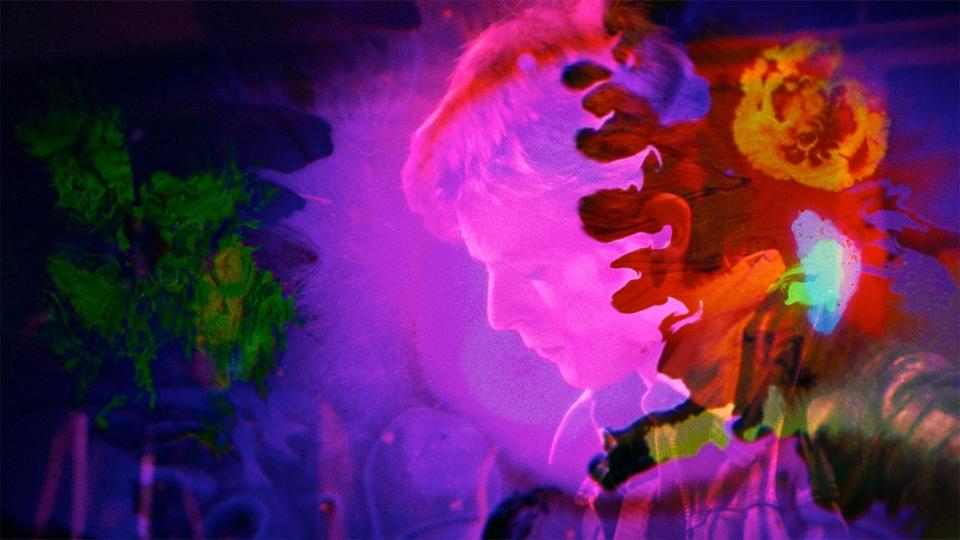Cannes review: Several David Bowies combine into one artist in the essential Moonage Daydream

David Bowie pounds his fist into his palm to make a point sometime during the late 1970s (the years are never identified) in Bret Morgen's transfixingly original profile Moonage Daydream. "I'm a fairly good social observer," he insists in the interview when pressed to reflect on the changes he imposed upon his own image, his face, his body, his music — all of them responses, in his view, to a seesawing century coming to an end.
It's both a supremely confident admission and a modest one, and that's the Bowie who dominates Morgen's intuitive, keenly shaped documentary (which premiered at the Cannes Film Festival tonight and comes to theaters in September): the vessel who took on the mantle of the monoculture and willfully became an alien, but a curious and politicized one, sometimes aloof but more often in conversation.
The result of over five years of research, edits, and tweaking, Moonage Daydream doesn't capture any new interviews (if anything, Bowie narrates it himself), but as the first authorized posthumous deep dive into his estate's massive archive, it supplies eye-opening surprises on a second-by-second basis. He never had a teddy bear ("I never liked children's things"). He detested Los Angeles, even when he lived there. He played John Merrick in Broadway's The Elephant Man without recourse to makeup or prosthetics. Charmingly, he was constantly wracked with doubts.

Neon
And while you do get the general shape of things — crying glam fans, coked-out limo rides, the escape to gray Berlin and art rock, Bowie's triumphant return to '80s commercial pop — Morgen ends up articulating a point that's deeper and more sophisticated than mere biography, an insight that feels like a serious contribution to music criticism. Bowie's life was a pendulum, swinging between an impulse to connect and another to withdraw. His music, so initially anthemic and euphoric, from "All the Young Dudes" and Ziggy Stardust's "Rock 'n' Roll Suicide" ("You're not alone!"), gave way to the need to recharge and regroup.
Those moments of detachment are the ones that Bowie's hardcore fans are going to treasure, and Moonage Daydream is loaded with them, like the weirdly arresting shot of the star in a green room circa "Let's Dance," watching TV alone, his back to us, like an outtake from The Man Who Fell to Earth. Morgen uses wonderfully strange footage of Bowie swanning around a neon-lit Singapore as a kind of visual metaphor: He is recognized but always moves ahead. Even when he's not advancing — as with the elephantine Glass Spider tour and his fallow late-'80s period — Morgen is smart enough to contextualize it not as an artistic failure, but as a weakening of self-identity: "I've come to the vacuum of my life," Bowie says under footage of Tina Turner cavorting with him in a Pepsi ad. (The turn? His marriage to Iman.)
Occasionally, Morgen's flow can feel belabored and imprecise, snippets of Buster Keaton, 8½, The Red Shoes, Nosferatu, and Plan 9 From Outer Space competing for space against more germane choices (not least a raft of Bowie's own movie work in The Hunger, Labyrinth, and Merry Christmas, Mr. Lawrence). But pruning would hamper the unencumbered risk-taking on display, extending to some atmospheric animation (as it did with Morgen's Kurt Cobain: Montage of Heck), an approach that that instantly vaults the effort to the top of the Bowie docs. The music itself, gorgeously remixed by Bowie's longtime producer and friend Tony Visconti, has never sounded better or stranger, with isolations of instrumental passages that stick in mind. "I put myself through everything," the subject says of his life near the end of Morgen's nearly two-and-a-half-hour immersion, and you may feel as much yourself. Grade: A–
Related content:
Cannes Film Festival 2022 preview: 12 movies not to miss
Legendary filmmaker David Cronenberg on his return to directing
Rachel Weisz (and Rachel Weisz) to star in TV adaptation of David Cronenberg's Dead Ringers

 Yahoo Movies
Yahoo Movies 